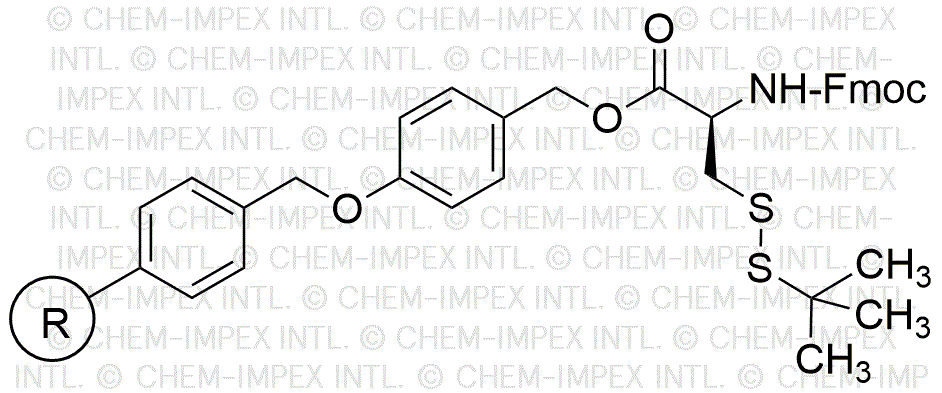Fmoc-S-tert-butylthio-L-cysteine 4-alkoxybenzyl alcohol resin is widely utilized in research focused on:
- Peptide Synthesis: This resin is essential for solid-phase peptide synthesis, allowing researchers to efficiently create complex peptides with high purity and yield.
- Drug Development: It plays a crucial role in the development of peptide-based therapeutics, providing a platform for modifying peptide structures to enhance their efficacy and stability.
- Bioconjugation: The resin facilitates the attachment of peptides to various biomolecules, aiding in the creation of targeted drug delivery systems and diagnostic tools.
- Research in Protein Engineering: It is used in studies aimed at modifying proteins, enabling scientists to explore new functionalities and improve existing protein properties.
- Custom Synthesis Services: Many laboratories offer custom synthesis using this resin, catering to specific research needs and providing tailored solutions for unique projects.
General Information
Properties
Safety and Regulations
Applications
Fmoc-S-tert-butylthio-L-cysteine 4-alkoxybenzyl alcohol resin is widely utilized in research focused on:
- Peptide Synthesis: This resin is essential for solid-phase peptide synthesis, allowing researchers to efficiently create complex peptides with high purity and yield.
- Drug Development: It plays a crucial role in the development of peptide-based therapeutics, providing a platform for modifying peptide structures to enhance their efficacy and stability.
- Bioconjugation: The resin facilitates the attachment of peptides to various biomolecules, aiding in the creation of targeted drug delivery systems and diagnostic tools.
- Research in Protein Engineering: It is used in studies aimed at modifying proteins, enabling scientists to explore new functionalities and improve existing protein properties.
- Custom Synthesis Services: Many laboratories offer custom synthesis using this resin, catering to specific research needs and providing tailored solutions for unique projects.
Documents
Safety Data Sheets (SDS)
The SDS provides comprehensive safety information on handling, storage, and disposal of the product.
Product Specification (PS)
The PS provides a comprehensive breakdown of the product’s properties, including chemical composition, physical state, purity, and storage requirements. It also details acceptable quality ranges and the product's intended applications.
Certificates of Analysis (COA)
Search for Certificates of Analysis (COA) by entering the products Lot Number. Lot and Batch Numbers can be found on a product’s label following the words ‘Lot’ or ‘Batch’.
*Catalog Number
*Lot Number
Certificates Of Origin (COO)
This COO confirms the country where the product was manufactured, and also details the materials and components used in it and whether it is derived from natural, synthetic, or other specific sources. This certificate may be required for customs, trade, and regulatory compliance.
*Catalog Number
*Lot Number
Safety Data Sheets (SDS)
The SDS provides comprehensive safety information on handling, storage, and disposal of the product.
DownloadProduct Specification (PS)
The PS provides a comprehensive breakdown of the product’s properties, including chemical composition, physical state, purity, and storage requirements. It also details acceptable quality ranges and the product's intended applications.
DownloadCertificates of Analysis (COA)
Search for Certificates of Analysis (COA) by entering the products Lot Number. Lot and Batch Numbers can be found on a product’s label following the words ‘Lot’ or ‘Batch’.
*Catalog Number
*Lot Number
Certificates Of Origin (COO)
This COO confirms the country where the product was manufactured, and also details the materials and components used in it and whether it is derived from natural, synthetic, or other specific sources. This certificate may be required for customs, trade, and regulatory compliance.

